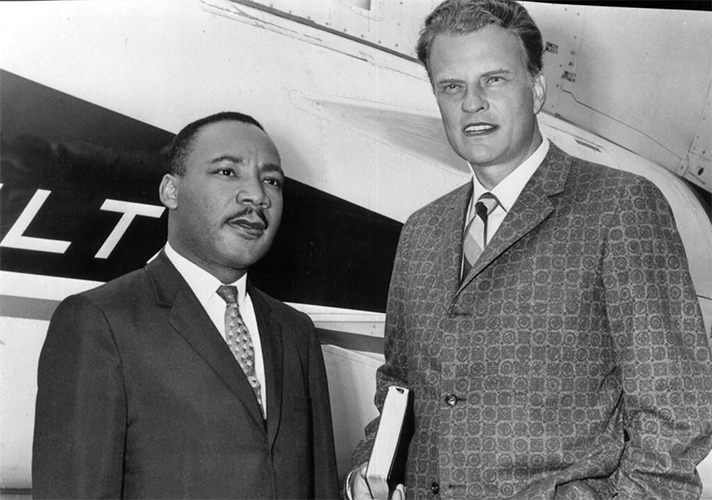The Billy Graham backlash: Why speak ill of the dead?
There's that ancient word to the wise that our present generation might do well to heed: 'Do not speak ill of the dead.' In the polarised age of furious Twitterstorms and instant hot-takes, we might do well not to speak too soon either.
Yesterday brought news of the passing of Billy Graham, age 99, the incomparably influential preacher who has shaped American evangelical Christianity. A flood of obituaries praised Graham's fervent faith and his legacy for the Church. But as is normal now in any online reaction, there came the backlash too.
Pink News summarised Graham simply as an 'Anti-gay evangelical preacher' in an article listing several controversial comments the evangelist had made throughout his career, including his position on homosexuality, and a comment he made – and immediately said he regretted – that AIDs was a 'judgment from God'. The progressive site The Advocate took a similar route with its response: 'What the Obits Aren't Saying: Evangelist Billy Graham Was a Homophobe'.

When former President Barack Obama tweeted in celebration of Graham's life, describing him as a 'humble servant who prayed for so many – and who, with wisdom and grace, gave hoped and guidance to generations of Americans,' one user received nearly 2,000 likes for their response: 'Delete this'.
Journalist Lauren Duca might have been the most scathing in her obituary: 'The big news today is that Billy Graham was still alive this whole time. Anyway, have fun in hell, bitch..."respecting the dead" only applies to people who weren't evil pieces of s**t while they were living, thanks.'
Of course, more broadly the reactions were more generous about the man who counselled numerous US presidents yet remained nonpartisan, who inspired millions and transformed the Christian culture of the day. Some raised antisemitic marks he made, others praised his work with Martin Luther King in the Civil Rights Movement.
But the diverse, impassioned reactions to the man's life prompt one to consider the good of our instant, intensely reactive responses to death of famous figures. The deluge of takes on the meaning of Graham's passing felt overdone, not because Graham wasn't significant, but because a flurry of articles assessing a man's legacy, be it in mourning or celebration, seems an odd, somewhat inhuman response to death. Yes, it's a symptom of our 24-hour instant-news culture in which time is ever of the essence, where if we don't react now, tomorrow will apparently be too late. Perhaps given that's just how our online news and social media function, so resistant to rest and genuine reflection, seeking change might seem ambitious. Indeed, saying nothing in response the death of a titan such as Graham might seem odd and improper too.
Billy Graham was a humble servant who prayed for so many - and who, with wisdom and grace, gave hope and guidance to generations of Americans.
— Barack Obama (@BarackObama) February 21, 2018
But why the need to so passionately lionise or denigrate the dead, so immediately after their end? As many have noted, Graham was a flawed human being who lived 99 years on the earth: of course he did and said things he regretted and that we wouldn't applaud. Of whom could we not say the same?
Regarding his comments in certain pamphlets about homosexuality, to jump to defend Graham here would be to miss the point. The blunt language certainly is offensive to many, and many would reject the theological sentiment as well; the church of course continues to be conflicted in debates over human sexuality. But it's also generally understood that it's not right to judge the past by the standards of the present. Not only that, but the world is full of people who disagree with you and who live complex lives that can't be summed up in a tweet. Engaging that difference is difficult, painful even, but is necessary for any meaningful community.
If you believe someone's views were 'problematic', that they made grave errors in their life that caused harm to others, then what you believe is that they were human, like you. You need not worship them as a god, nor dismiss them as a demon – mercifully and radically, you need not say anything at all.
Not speaking ill of the dead is quite a challenge in the adversarial, grandstanding age of the culture wars. But it's an urgent call. Forgetting the essential humanity of those we've lost, we might just lose our own in the process.
You can follow @JosephHartropp on Twitter











